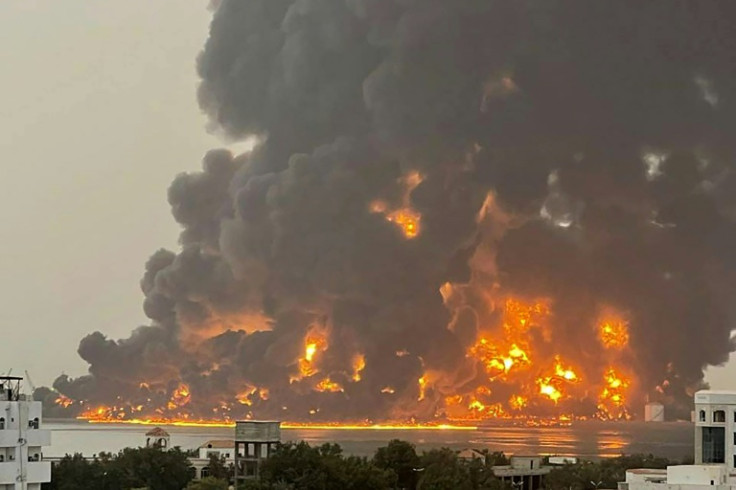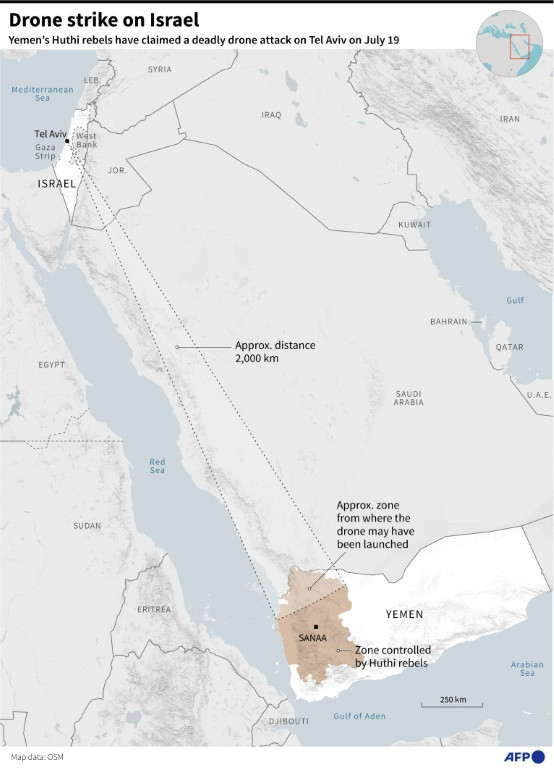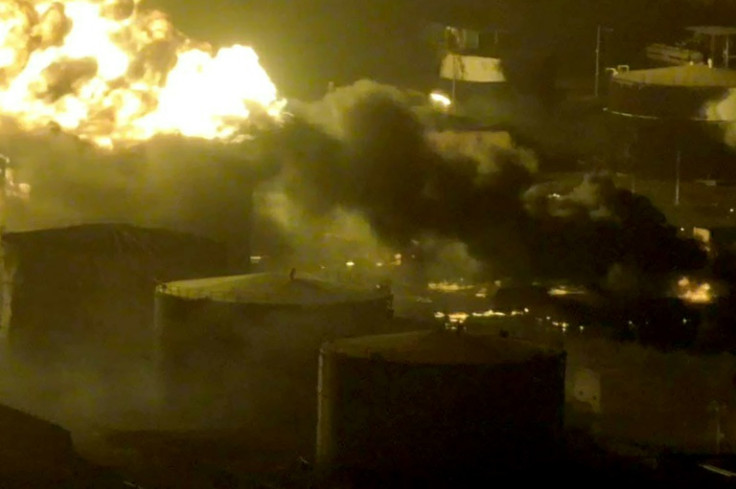Israel Strikes Yemen Rebels After Deadly Tel Aviv Attack

Israeli warplanes struck the Huthi-controlled Yemeni port of Hodeida Saturday, a day after a drone attack by the Iran-backed rebels killed a civilian in Tel Aviv, both sides said.
The strikes, which triggered a raging fire and plumes of black smoke, are the first claimed by Israel in the Arabian peninsula's poorest country, some 1,800 kilometres (1,100 miles) away, analysts said.
"The blood of Israeli citizens has a price," Israeli Defence Minister Yoav Gallant said, adding more operations against the Huthis would follow "if they dare to attack us".
Gallant said the Hodeida strikes were also a warning to other Iran-backed armed groups around the Middle East that have claimed attacks on Israel during the Gaza war.
"The fire that is currently burning in Hodeida, is seen across the Middle East and the significance is clear," he said.
Just hours after Friday's strike in Tel Aviv, Gallant had vowed Israel would retaliate against the Huthis, who control swathes of Yemen, including much of its Red Sea coast.
The Israeli military said "fighter jets struck military targets of the Huthi terrorist regime in the area of Hodeida port in Yemen in response to the hundreds of attacks carried out against the state of Israel in recent months".
The Huthis have previously claimed attacks on Israeli cities including Ashdod, Haifa and Eilat, but Friday's strike on Tel Aviv appears to have been the first to breach Israel's vaunted air defences.
In a statement on social media, top Huthi official Mohammed Abdulsalam reported a "brutal Israel aggression against Yemen."
The attack targeted "fuel storage facilities and a power plant" in Hodeida "to pressure Yemen to stop supporting" Palestinians in the Gaza war, he said.
The Huthi-run health ministry said there were deaths and injuries in the Hodeida strikes, but it did not give a toll.
In a statement carried by the Huthi-run Al Masirah television, it said several people suffered "serious burns".
Footage aired by Al Masirah, which AFP could not independently verify, showed a massive blaze on the seafront, with a large plume of black smoke rising into the sky.
The channel also broadcast images of casualties being treated in hospital, many of them bandaged and lying on stretchers in packed rooms.
A man interviewed by the broadcaster said many of the wounded were port employees.
An AFP correspondent in Hodeida reported hearing several large explosions and seeing smoke over the port.
"The city is dark, people are on the streets, petrol stations are closed and seeing long queues," said a Hodeida resident, who spoke on condition of anonymity citing safety concerns.
Maritime security firm Ambrey said it observed four merchant vessels in the port at the time of the air strike and another eight in the anchorage.
"No damage to merchant vessels has been reported at this time," it said.
The United States, which along with Britain has carried out several rounds of air strikes against the Huthis in an attempt to put an end to their attacks on shipping in the Red Sea, said it played no part in Saturday's strikes.
"The United States was not involved in today's strikes in Yemen, and we did not coordinate or assist Israel with the strikes," a US National Security Council spokesman said.
"We've been in regular and ongoing contact with the Israelis following the strike in Tel Aviv that killed an Israeli civilian on Friday morning. We fully recognise and acknowledge Israel's right to self-defence."
UN chief Antonio Guterres had appealed for "maximum restraint" after the Tel Aviv drone strike to avoid "further escalation in the region".
But Huthi politburo member Mohammed al-Bukhaiti swiftly threatened revenge for the Hodeida strikes.
"The Zionist entity will pay the price for targeting civilian facilities, and we will meet escalation with escalation," he said in a post on social media.
The Huthis' Supreme Political Council vowed the "aggression will not pass without an effective response."
Hodeida port, a critical entry point for imports and international aid for rebel-held areas of Yemen, had remained largely untouched through the decade-long war between the rebels and the internationally recognised government propped up by neighbouring Saudi Arabia.
"Traders now fear that this will exacerbate the already critical food security and humanitarian situation in northern Yemen, as the majority of trade flows through this port," said Mohammed Albasha, senior Middle East analyst for the US-based Navanti Group.
He said the Israeli strikes "would likely be perceived by many Yemenis as an attack on their homeland, which could bolster Huthi recruitment and funding."


© Copyright AFP 2024. All rights reserved.






